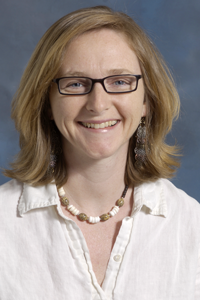Food insecurity among nutrition-related studies by Arnold School faculty
May 20, 2010

Edward Frongillo

Sonya Jones
Food insecurity.
It’s a phrase that masks a more unsettling word – hunger. And for millions of American children and adults, food insecurity means not having enough food to meet the needs of a household.
Arnold School of Public Health nutrition experts recently presented research on food insecurity at Experimental Biology 2010 (EB2010), an annual meeting of nearly 13,000 scientists and exhibitors. The event was held in Anaheim, Calif.
Food insecurity has become an increasingly important subject among healthcare professionals, researchers, government agencies and service providers. A 2009 report from the U.S. Department of Agriculture found that nearly 15 percent of American households were food “insecure” at some point in 2008 – up more than 11 percent from 2007. Food insecurity was highest among households of single mothers with children, followed by single men with children.
A study presented at EB2010 by Dr. Edward Frongillo, chair of the Department of Health Promotion, Education, and Behavior, and other researchers from the University of South Carolina’s Arnold School found that children are not completely buffered from food hardships, despite their parents’ attempts to protect them.
“Children were aware of household food insecurity and took responsibility for trying to make food resources last,” said the study’s authors who interviewed 22 families at risk for food insecurity.
“Awareness was cognitive (knowing that food is scarce), emotional (worry, sadness, or anger related to food insecurity), and physical (hunger, pain, tiredness, or weakness …),” they wrote.
Mike Burke, an Arnold School Ph.D. student from the Department of Health Promotion, Education, and Behavior, gave a talk based on a study of children’s long-term exposure to food insecurity in the United States, a particularly relevant topic given the recent push to end child hunger by 2015.
The study by Burke, Frongillo and Dr. Sonya Jones, an assistant professor at the Arnold School and Deputy Director of the Center for Research in Nutrition and Health Disparities, focused on food insecurity patterns among children in four grades – kindergarten, third, fifth and eighth grades. They found that 28 percent of households were food insecure during at least one grade; 38 percent of households were considered “persistently food insecure.”
The researchers wrote, “… policies that reach children in persistent in food insecurity should be a high priority, followed by strategies that improve the effectiveness of existing programs for families that experience intermittent food insecurity.”
The Arnold School researchers were members and guests of the American Society of Nutrition (ASN), which holds its annual meeting in conjunction with the Federated Associations of Experimental Biology (FASEB).
Frongillo has been the chair of the Community and Public Health Research Interest Section of the ASN, serving as chair of the group for the past two years. The group currently has 236 members, up from 188 a year ago. Jones is the incoming chair of the section.
“The EB2010 conference was an important venue to spotlight the University’s strong research commitment in nutrition and its presence as having a leading nutrition program,” Jones said. “Food insecurity is just one of the nutrition-related topics in our research at the Arnold School. our studies have a national and international reach.”
Jones, who presented a paper at EB2010 on food choices in vending machines in S.C. public schools, recently was the lead author of a study published in the April issue of Public Health Nutrition on the consumption of sweetened beverages among school-age children.
Nutrition wasn’t the only topic for Arnold School presenters. Exercise scientist Dr. Steve Blair, gave a talk: “Is exercise important for health benefits independent of body weight?”



_01.jpg)
_02.jpg)